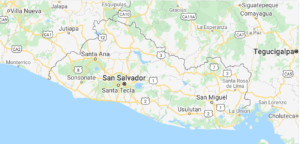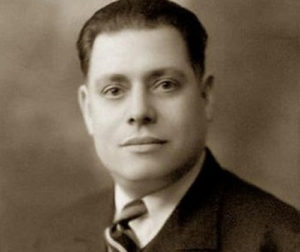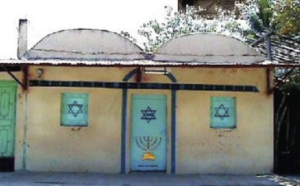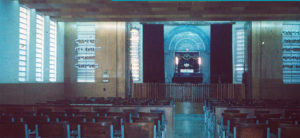 Spanish and Portuguese Conversos lived in El Salvador’s throughout the centuries. In the early 19th century the first Jews to arrive in El Salvador were Sephardi from France who settled in the town of Chaluchuapa. During the subsequent decades, Sephardic families from Germany, Turkey, Tunisia, and Egypt arrived in the country. Jews from Central Europe followed and in the subsequent years, the community swelled to nearly 400 people until the beginning of the Civil War.
Spanish and Portuguese Conversos lived in El Salvador’s throughout the centuries. In the early 19th century the first Jews to arrive in El Salvador were Sephardi from France who settled in the town of Chaluchuapa. During the subsequent decades, Sephardic families from Germany, Turkey, Tunisia, and Egypt arrived in the country. Jews from Central Europe followed and in the subsequent years, the community swelled to nearly 400 people until the beginning of the Civil War.
On July 30, 1939, President Martinez barred the entry of fifty Jewish refugees bound for El Salvador on the German ship, Portland. The refugees had each paid $500 for Salvadoran visas in Budapest and Amsterdam, but upon arrival to El Salvador, the visas were declared “fraudulent” and the refugees were returned to Germany. Other families explain that El Salvador closed its borders to Jews in 1939 leading some individuals to seek other assistance.
 El Salvador’s Consul General for Geneva, José Arturo Castellanos Contreras, worked with a Jewish-Hungarian businessman named György Mandl to help save up to 25,000-50,000 Jews by granting bogus nationality certificates, despite lacking the authority to do so. These were made more authentic by having them stamped by other consulates in Geneva before being given to grateful recipients to fill in their details. Many of the documents were sent to Budapest where Carl Lutz, the Swiss vice-consul, provided sanctuary to thousands of Jews at an abandoned glass factory known as his “Glass House”. The so-called “freedom papers” afforded protection against deportation to Nazi extermination camps and gave meaning to the name El Salvador. Col. Castellanos never charged for the life-saving Salvadoran documents he issued.
El Salvador’s Consul General for Geneva, José Arturo Castellanos Contreras, worked with a Jewish-Hungarian businessman named György Mandl to help save up to 25,000-50,000 Jews by granting bogus nationality certificates, despite lacking the authority to do so. These were made more authentic by having them stamped by other consulates in Geneva before being given to grateful recipients to fill in their details. Many of the documents were sent to Budapest where Carl Lutz, the Swiss vice-consul, provided sanctuary to thousands of Jews at an abandoned glass factory known as his “Glass House”. The so-called “freedom papers” afforded protection against deportation to Nazi extermination camps and gave meaning to the name El Salvador. Col. Castellanos never charged for the life-saving Salvadoran documents he issued.
As the war progressed, Col. Castellanos and Mr. Mandel-Mantello realized they couldn’t issue visas fast enough so they secretly distributed over 13,000 certificates of Salvadoran citizenship, each document protecting an entire family. Thousands of European Jews with no connection to El Salvador suddenly became citizens, offering them protection from deportation and arrest. These certificates were smuggled to Jews living in France, Hungary, Poland, Germany and Czechoslovakia. Col. Castellanos used his diplomatic position to convince officials that the Salvadoran citizenship papers were in fact genuine.
 It wasn’t until the 1940’s, that the Salvadoran Jewish community was founded. In 1944, the Comunidad Israelita de El Salvador was established. A year later, the Jewish centre was opened. Herbert de Sola helped to found the first synagogue in 1950 in the capital. It is still in use today, and remains the only synagogue in the country. The community grew to around 150 members. A new community centre and synagogue were inaugurated. Rabbi Fernando Lapiduz formerly from Argentina increased Jewish life significantly.
It wasn’t until the 1940’s, that the Salvadoran Jewish community was founded. In 1944, the Comunidad Israelita de El Salvador was established. A year later, the Jewish centre was opened. Herbert de Sola helped to found the first synagogue in 1950 in the capital. It is still in use today, and remains the only synagogue in the country. The community grew to around 150 members. A new community centre and synagogue were inaugurated. Rabbi Fernando Lapiduz formerly from Argentina increased Jewish life significantly.
By 1976, there were roughly 370 Jews residing in El Salvador. However, in 1979 the Salvadoran Civil War commenced, and lasted until 1992. Due to kidnappings and murders, many Jews in the community left El Salvador during the conflict. During this time, there was no rabbi. No one who could read Torah, and there was no proper synagogue. Once peace was attained, several Jewish families returned to the country. Today, an estimated 150 Jews reside in El Salvador. The San Salvador synagogue is mainly Conservative, and also contains classrooms and a playground. Trying to live a Jewish life in El Salvador is often difficult. There is no kosher food available and the Jewish population is so small as to make a Jewish match almost impossible. Mixed marriages with converted partners are the rule, unless it is someone outside the country.
 In addition to the 150 Jews mentioned previously, there are also anumber of recent conversions. Around 260 men, women and children, most of whom are descended from Spanish/Portuguese émigrés fleeing the Spanish Inquisition, have embraced their Jewish roots and are following an orthodox life style. Many members of the community were from mixed-marriages and not halachically Jewish. These Jews, mostly with children, decided to become more connected to ensure a Jewish education for their family.
In addition to the 150 Jews mentioned previously, there are also anumber of recent conversions. Around 260 men, women and children, most of whom are descended from Spanish/Portuguese émigrés fleeing the Spanish Inquisition, have embraced their Jewish roots and are following an orthodox life style. Many members of the community were from mixed-marriages and not halachically Jewish. These Jews, mostly with children, decided to become more connected to ensure a Jewish education for their family.